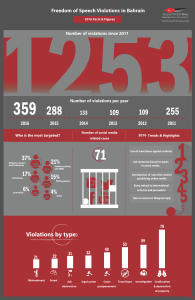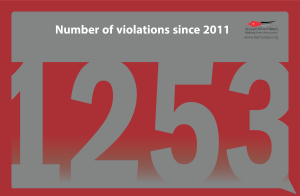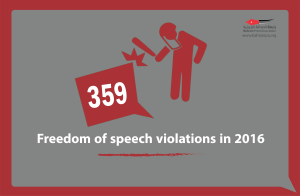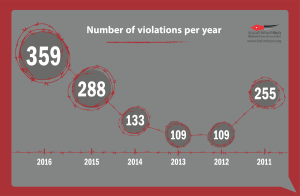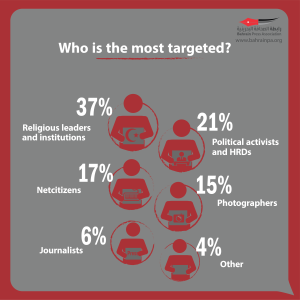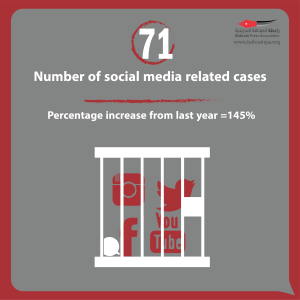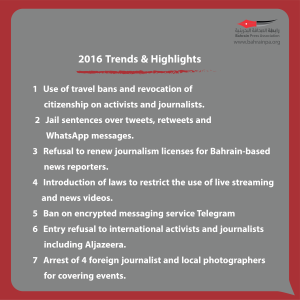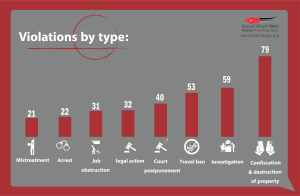2016: 359 Violations of the Freedom of Expression and Opinion in Bahrain
2016 proved a difficult year for journalists, photographers, and internet activists as Bahraini authorities tightened their grip on freedom of expression. With the intensified prosecution of bloggers and twitter-users, fear and caution among social media users heightened to an unprecedented level within the past five years, including the years following the 2011 political protests. This restricted freedom was also experienced by lawyers, human rights activists, and leaders of political societies, resulting in either the disappearance of social media accounts known for their blatant criticism of local issues or the adoption of subtler ways of communicating opinions by operating social media users.
State surveillance extended to private chat groups in smartphone devices as well, with records of cases referred to trial for expressing views in private social media applications, such as WhatsApp. The state also banned the use of the application Telegram due to the difficulty of surveilling its users. Additionally, the Information Affairs Authority activated new policies to regulate the work of local journalists affiliated with international news agencies and the foreign press and arbitrarily refused to renew the license of many of them without providing a reason.
Furthermore, the authorities have continued to disrupt internet services in the village of Diraz, north of the country, since last June. This has been done on a daily basis from 7 pm to 1 am through disabling communication towers and disrupting fixed communication lines.
In 2016, Bahrain Press Association recorded around 359 cases of violations of fundamental human rights, such as the freedom of expression and opinion and free press. These violations included sentences and judicial measures against citizens in cases related to freedom of expression (37 cases), arbitrary arrest (22 cases), investigation and interrogation (62 cases), impediment of work (32 cases), and many other cases. What follows is a description of the main cases that Bahrain Press Association recorded for the year of 2016:
The Judiciary and the Courts
On January 19, 2016 the Second Criminal High Court of Appeal upheld the verdict against feminist activist Ghada Jamsheer of two-month imprisonment and a bail of 100 dinars for “defaming an employee at King Hamad Hospital via her twitter account.” The court reduced the second sentence issued against her for “insulting and defaming the director of the hospital” from one year to two months, bringing the total period of her imprisonment to four months.
On February 1, 2016 the Court of Appeal upheld the imprisonment of former Member of Parliament Khalid Abdul Aal for a period of one year for “insulting the Ministry of Interior via his twitter account.” The court also supported the verdict against photographer Ahmed al-Fardan of three-month imprisonment on the charge of “illegal assembly” on February 3, 2016.
On March 10, 2016 the Third Lower Criminal Court ruled the imprisonment of twitter-user Hussain al-Mehdi, also known by his twitter name Takroz, for a period of one year and a fine of 10 thousand dinars for “insulting the king.” In the meantime, the First Lower Criminal Court fined on March 23 a young Bahraini male whose name was not disclosed 200 dinars for “insulting the House of Parliament on social media.”
On March 31, 2016 the Fifth Lower Criminal Court sentenced Ibrahim Kareemi to two years of imprisonment and a fine of 2100 dinars for “insulting the King of Bahrain and an ally country” through his twitter account Fireej Kareemi. On April 21, 2016, a local court sentenced photographer Husaam Suroor to 15 years of imprisonment for “participating in an illegal assembly” and “attacking the police.”
On May 9, 2016 the Lower Criminal Court sentenced Mohammed bin Sagr Al-Khalifa, owner of the twitter account Mnerfizhm, five months of imprisonment in two cases in which he was accused of “insulting two individuals via his twitter account.” The court also set a 300-dinar bail for both cases. On May 24, 2016, the same court sentenced him to seven months of imprisonment for three other cases involving “insulting figures and accusing them of membership of the Academy of Change as well as inciting the overthrow of the government.” The court granted him bail at the sum of 500 dinars on all three cases.
On May 24, 2016 the Third Lower Criminal Court imposed one-year imprisonment for Shaikh Mohammed al-Minsi for delivering a sermon “insulting the Ministry of Interior.” On May 30, 2016, the Higher Court of Appeal increased a sentence issued against the Secretary-General of al-Wifaq Society Shaikh Ali Salman from four years to nine years of imprisonment on the charges of “inciting the overthrow of the regime by force,” “contempt for a religious sect,” and “non-compliance with the laws.”
On August 31, 2016 a local court sentenced internet activist Hameed Khatim to two-year imprisonment for “publishing phrases that incite hatred against the regime and offend the King” via his twitter account. The sentence was later reduced to one year by the Court of Appeal. A day prior, the Ninth Lower Criminal Court issued a verdict against internet activist Tayyibeh Isamil of one-year imprisonment and a fine of 1000 dinars for “insulting the King and publishing tweets that undermine security and peace in Bahrain.”
On September 7, 2016 the Second Higher Court of Appeal upheld a first-degree verdict against Dr. Saeed al-Samaheeji of one-year imprisonment for “insulting an ally country (Saudi Arabia),” “publicly inciting non-compliance with the laws and regulations,” and “publicly inciting participation in unauthorized marches and assemblies” via his twitter account.
On October 26, 2016 the Court of Appeal modified a sentence issued against the former Secretary-General of the National Democratic Association (al-Wahdawi) Fathil Abbas for “spreading false news and harming armed operations.” His sentence was reduced from five years to three years of imprisonment. A month later, on November 29, 2016 the Lower Criminal Court sentenced journalist Faisel Hayyaat to three months of imprisonment on the charges of “insulting a religious figure and attacking a sect” via twitter.
On November 12, 2016 the Higher Court of Appeal also reduced a sentence on issued against twitter-user Yousuf al-Am, known by the twitter name Hajji Ahmed, from 5 years to 3 years of imprisonment for “insulting the armed forces of Operation Decisive Storm” and “publishing information inciting harm and public fear in a period of war.”
Arrest Cases
On March 16, 2016 the Ministry of Interior arrested the owner of twitter-account Arabian Nights for “publishing obscene video clips.” The following day, the General Directorate of Anti-Corruption and Economic and Electronic Security stated that it arrested two individuals, without disclosing their names, for publishing “a video clip the Ministry of Interior deems offensive of one of the sects in Bahrain.”
On April 17, 2016 the Public Prosecutor’s Office arrested Shaikh Mohammed al-Mensi (46 years), a Shiite religious cleric and the Imam of al-Zahra mosque, for a week pending investigation on the charges of delivering a speech “inciting hatred against the regime” and “insulting the Ministry of Interior.” On April 20, 2016 the Public Prosecutor also arrested twitter-user Sayyid Hasan Alawi al-Shahrakani for a period of one week pending investigation for “insulting the King, the flag, and the national emblem” upon reciting a poem at a funeral in the Shahrakaan area.
On June 27, 2016 the security authorities apprehended artist Khalil al-Madhoon after being summoned for investigation at the Criminal Investigations office in Adliya for “comments published on his Instagram account.” On July 7, 2016 internet activist Mohammed al-Alawiyyat, a football player at Al-Sitra Sports Club, was also questioned for “insulting the King.” His case was referred to the Public Prosecutor, which decided to detain him for seven days pending investigation.
On July 26, 2016 the Cyber Crime Directorate announced the arrest of a number of individuals, whose names were not disclosed, for what it described as “misuse of social media by publishing inflammatory materials punishable by the law.” On August 7, 2016, the Public Prosecutor arrested the Shiite religious cleric Shaikh Essa Al-Momen for 7 days pending investigation after delivering a sermon in al-Khaif mosque in al-Dair.
On August 18, 2016 the Sunni Waqf Administration summoned one of its religious clerics, whose name was not revealed, to receive an order banning him from public speaking and to sign a pledge to abide by the ethics of religious sermons.
On December 29, 2016 the Public Prosecutor arrested prominent human rights activist Nabeel Rajab for one week pending investigation after he was charged of “publishing and spreading false information and tendentious rumors about the internal situation in the Kingdom, which undermine its prestige.”
On October 31, 2016 the Public Prosecutor apprehended Shiite religious cleric Shaikh Hani al-Banaa for 15 days after he was charged of “inciting hatred against the regime and inciting violation of the law.”
Investigation and Interrogation
On January 3, 2016 the Public Persecutor conducted an investigation with the Editor-in-Chief of al-Watan newspaper Yousuf al-bin Khalil and the Editor-in-Chief of al-Bilad newspaper Monis al-Mardi for “publishing a press release that contains slander and defamation of a member of the Parliament.” On March 28, 2016, the security authorities summoned prominent Bahraini poet Ahmed al-Ajmi to interrogate him at Nabih Saleh police station. The interrogation was conducted after al-Ajmi recited a poem at the headquarters of the National Democratic Actions Society (Waad) in solidary with its former Secretary-General Ibrahim Sharif.
On July 16, 2016 the Public Persecutor interrogated journalist Nazeeha
Said, a correspondent for France 24 television station and Radio Monte Carlo station, regarding “a case filed against her by the Information Affairs Authority accusing her of practicing journalism without a license.” On December 22, 2016, the prison authorties conducted an investigation with detained activist Nabeel Rajab regarding an article attributed to him and published by the French newspaper Le Monde containing what it deemed as “tendentious and false news and rumors” about the countries of the Gulf.
On November 10, 2016 the Public Persecutor interrogated human rights lawyer Mohammed al-Tajir after he was charged of, “insulting state institutions” “inciting hatred against the regime and threatening civil security,” and “misusing a communication device.” On November 24, 2016 the Public Persecutor also summoned journalist Ahmed Radhi and questioned him for participating in an “illegal assembly”
On November 23, 2016 the Public Persecutor conducted an investigation with Dr. Rula al-Saffar, President of Bahrain Nursing Society, after being charged of “inciting hatred against the regime and threatening civil peace.” On the same day, human rights lawyer Ebtisam al-Saegh was summoned over charges of “mocking and inciting hatred against the regime and undermining national security and civil peace.”
On November 17, 2016 the Public Prosecutor interrogated Hussain Radhi, a member of Bahrain Center for Human Rights, for “inciting hatred against the region and spreading false news undermining civil peace.” On November 13, 2016 oppositionist Ibrahim Sharif was also summoned over claims of “making statements to a foreign press that offend the constitutional system of the Kingdom.”
The Ashuraa season (October 2-12, 2016) also witnessed numerous cases of interrogation of tens of religious singers, preachers, and leaders, amounting to 32 cases of interrogation and 9 cases that prohibited the movement of religious preachers.
Impediment of Work
On January 7, 2016 the Information Affairs Authority banned al-Wasat newspaper from publishing video clips on Youtube, claiming that the newspaper license “does not include publishing and exhibiting news footage.” On February 14, 2016 the security authorities arrested four American journalists, including independent journalist Anna Therese Day and her filming crew while covering the fifth anniversary protests of the February 14 uprising.
On April 17, 2016 the security authorities banned Hasan Jamali, a photographer for the American news agency The Associated Press, and Nazeeha Said, a correspondent for France 24, from attending a press conference held by the U.S. Secretary of State John Kerry in Manama, citing “the expiration of their license” as the reason.
On April 10, 2016 the Customs Directorate at Bahrain International Airport confiscated private photography equipment and other devices belonging to 18 local and foreign journalists, photographers, and correspondents after covering a military training for U.S. forces stationed in Bahrain that had not yet been released. The following month, the Information Affairs Authority refused to renew the license of reporters Hasan Jamali (May 31, 2016) and Nazeeha Said (June 7, 2016), both of whom work for foreign media. On June 29, 2016 Said was banned from travelling at Bahrain International Airport.
On July 7, 2016 the security authorities also prevented journalist Ahmed Radhi from leaving Bahrain after he had planned to fly to another Gulf country from Bahrain International Airport. On September 22, 2016 the Information Affairs Authority refused to renew the work license of Mohammed al-Shaikh, the photographer of the French news agency Agence France-Presse (AFP). On September 30, 2016 the work license of Reuters photographer Aamir Mohammed was also denied renewal.
On December 6, 2016 the security authorities arrested staff members working for the London-based Arabic Television while covering the Gulf Cooperation Council (GCC) Summit hosted in Manama on the same day. In addition, al-Jazeera Qatari channel announced that the Bahraini authorities prevented its crew from covering the summit. CNN Arabic correspondent Mohammed al-Ghasra was also banned from reporting on the summit on the same day.
